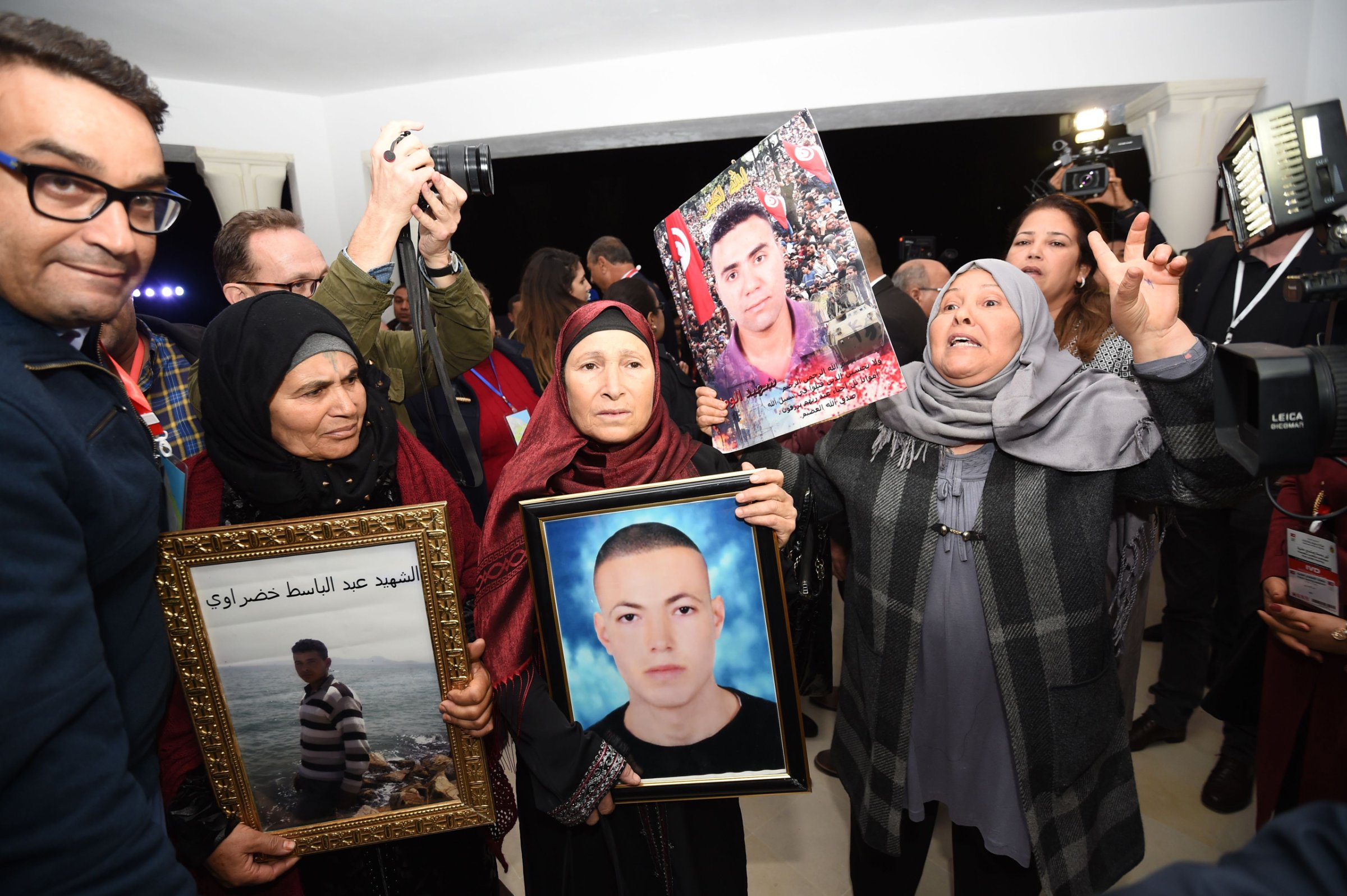
They are dissidents who endured torture at the hands of the security forces. A mother of a young man shot dead during protests. Women stripped, raped and beaten by security officers. An opposition activist named Gilbert Naccache testified that while he was jailed, torture became routine. “You get used to it – 3, 4 days a week are painful,” he said, according to the International Center for Transitional Justice.
These are just a few of the stories of thousands of people who contributed to Tunisia’s Truth and Dignity Commission, the country’s attempt to account for decades of abuses under the dictatorship that came tumbling down during the massive protests of December 2010 and January 2011. The commission, set up by the country’s constitution-drafting body in 2013, has already compiled more than 62,000 complaints and testimonies from victims of the regime of autocrat Zine al-Abidine Ben Ali. On Saturday, the sixth anniversary of Ben Ali’s fall, the third of three planned sets of televised hearings will be held.
In 2011, Tunisia’s uprising triggered the avalanche of public revolts known as the Arab Spring. Revolution has spawned chaos and war in several countries (Libya, Yemen, Syria) and yielded to repression in others (Egypt, Bahrain). Only Tunisia has managed to transition to something akin to a functioning democracy.
That transformation is incomplete, analysts and rights activists are quick to point out. Some Tunisians chafe at the suggestion that their country is the sole “success story of the Arab Spring”—a label they say sets the bar too low in a region riven by violence. The committee hearings, however, allow Tunisia to accomplish something never achieved by its neighbors: a public accounting of the trauma that authoritarianism leaves behind.
“It’s a way to reckon with this abusive past and the practices of repression and oppression, and to hear the voices of the victims,” says Amna Guellali, the Tunisia director for Human Rights Watch, speaking by phone on Friday. “To bring to light some of these horrendous stories, it means everyone has to look at what happened, look at the reality, and not try to put it aside anymore and brush it away from the public sphere.”
It is by no means a perfect reckoning. Even as victims of past abuses address the nation, some of those rights violations continue. Human rights groups have documented ongoing torture by elements of the security forces, including deaths in custody. Officials from Ben Ali’s regime remain active in politics, including Tunisia’s current president Beji Caid Essebsi, who served for years under the dictatorship. Pro-government Tunisians support amnesty for former regime officials accused of corruption, a step that would negate some efforts to hold members of the Ben Ali regime accountable. The president has so far not attended any of the truth commission’s hearings.
“These guys have their project, and it’s opposed to the project of transitional justice led by the Truth and Dignity Commission. It’s not anymore about recovering from dictatorship and starting a new path. It’s about who will win the fight between these two political projects,” says Haythem Mekki, a Tunisian journalist and commentator.
Tunisia avoided catastrophe in part through a grand act of political compromise. Elected in the country’s first free election following the uprising, the Islamist Ennahda party gave up power in 2013 in the face of a political crisis. A “quartet” of civil society leaders brokered Ennahda’s departure, an act of diplomacy that won them the Nobel Peace Prize in 2015.
Still, the country faces immense challenges, including economic troubles, and security questions. Jihadist groups have exploited Tunisia’s experiment with political freedom, and the country has become one of the highest per capita exporters of foreign fighters to the battlefields of Syria and Iraq.
Human rights advocates acknowledge that the commission itself is an imperfect vehicle for resolving years of misrule and abuse under Ben Ali, a secular dictator who modeled his rule in part on France’s aversion to religion. Prosecuting and trying the alleged perpetrators is expected to be a complex and difficult process.
“Let’s be clear: this is only a first step. This is only a partial part of the whole entire process of healing and reform—of dealing with the past. There is absolutely no closure. We have only had so far five sessions and it’s only a tiny part of the truth commission and the whole entire transitional justice process,” says Geullali of Human Rights Watch.
But a record of the thousands of alleged acts of torture, rape, and unlawful killing will be a foundation for that process, Mekki says, and an act of catharsis. “If we don’t have a correct diagnosis on what happened, we will never be able to realize justice. We will not be able to heal from the wounds of the past, and most importantly we will never be able to reform our institutions.”
So as Tunisians tune in to see the dreadful record of their past dissected on live television this weekend, the hope is it will steel them for the traumas still to come, as the hard work of rebuilding the nation continues.
More Must-Reads From TIME
- The 100 Most Influential People of 2024
- The Revolution of Yulia Navalnaya
- 6 Compliments That Land Every Time
- What's the Deal With the Bitcoin Halving?
- If You're Dating Right Now , You're Brave: Column
- The AI That Could Heal a Divided Internet
- Fallout Is a Brilliant Model for the Future of Video Game Adaptations
- Want Weekly Recs on What to Watch, Read, and More? Sign Up for Worth Your Time
Contact us at letters@time.com